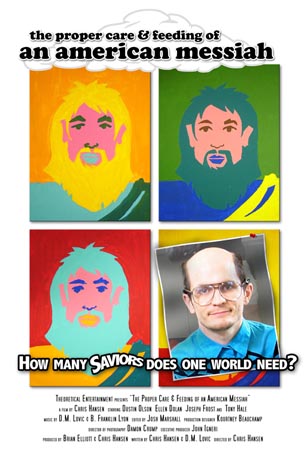Documentary Seminar
So, in the spring semester, I'm teaching a graduate seminar in documentary film. I was thinking about the course today because I had reached the deadline for selecting texts for the class.
The challenge for this particular seminar is the audience. It will likely be a mix of production-oriented grad students and those who have no production experience and are interested in documentary from a theoretical and analytical point of view.
I want to the class to be useful to both groups, and I think there are elements of both theory that are important to the production students and ideas about the actual practice of making a documentary film that will be interesting and useful to the non-production students.
But, of course, the non-production students will not have enough expertise (or interest) to support an entire course focused on the filmmaker aspects, and the production students should have the opportunity to practice the craft.
In light of all that, I'm thinking about ways to make the course useful for both audiences.
I plan to have the production students make short projects in a variety of documentary genres, and I was thinking of having the non-production students work with them on both the conceptualizing of the films and the actual shooting. And, assuming the films are any good, I was thinking the non-production students could engage in analysis and critique of the production students' efforts.
But - I want to go further than that. So, I'm not sure who all is reading my blog, but I'd be very interested in hearing any ideas my readers have about ways I can engage and teach both audiences in a cohesive and coherent manner.
The challenge for this particular seminar is the audience. It will likely be a mix of production-oriented grad students and those who have no production experience and are interested in documentary from a theoretical and analytical point of view.
I want to the class to be useful to both groups, and I think there are elements of both theory that are important to the production students and ideas about the actual practice of making a documentary film that will be interesting and useful to the non-production students.
But, of course, the non-production students will not have enough expertise (or interest) to support an entire course focused on the filmmaker aspects, and the production students should have the opportunity to practice the craft.
In light of all that, I'm thinking about ways to make the course useful for both audiences.
I plan to have the production students make short projects in a variety of documentary genres, and I was thinking of having the non-production students work with them on both the conceptualizing of the films and the actual shooting. And, assuming the films are any good, I was thinking the non-production students could engage in analysis and critique of the production students' efforts.
But - I want to go further than that. So, I'm not sure who all is reading my blog, but I'd be very interested in hearing any ideas my readers have about ways I can engage and teach both audiences in a cohesive and coherent manner.



11 Comments:
Documentaries! Now you're speaking my language.
I think the key to going "further" as you mention. Is to challenge each group to think like the other group. We both know the documentaries that are the most interesting and successful are those who inexorably marry craft and content.
So, I think giving oportunities to put them in each other's shoes would be best. Or perhaps instead of making the projects like a baton passing relay where the theory folks pass it off to the production folks, I think it should be more like a three legged race, where the two are tied to each other and forced to work in their area of weakness alongside someone stronger.
Just my thoughts (after thinking aout it FAR less than you have).
Will you be showing docs? May I recommend my favorites?
Stevie
My Kid Could Paint That
Man on Wire
Sound and Fury
Dark Days
Darkon
I like the idea of pairing a prod. student with a non-prod. student to work together. I'll have to think about that.
I AM planning on showing docs and will have a regular weekly screening. I haven't yet decided what I'm going to show -- I want to move beyond just showing docs that I like and focus perhaps on problems of representation in docs -- i.e., the complicated nature of "reality" or "truth" in documentaries (which is something I'm thinking about as a theme for the class).
I've actually been trying to give this some thought, but been a long, long time since I've been in film school.
However, I used to think I didn't like documentaries, then I took an "aesthetics in documentary" class by this far-out professor. I'm not exactly sure how the course began, but he was like, "Ok, let's learn about documentaries." And then he showed us the Preston Sturgis film "Sullivan's Travels." Then, he showed us "David Holtzman's Diary." And only then, did he start talking about actual documentaries.
He was a professor who wouldn't explain anything at all to the class, but you got the idea he was telling us that docs are a manipulation of reality just like any fiction film is. He was kinda crazy, but I really enjoyed his teaching approach. Other students didn't like him.
Not sure what my point is, but your comment right above made me think of that class that got me to love documentaries.
Mike--
That's definitely where I'm going -- trying to think of films that bring that out, that allow us to discuss the many ways that docs manipulate, depending on point of view.
Ok, this popped into my head. It's probably not feasible at all, but here's an idea to maybe prove these points in a practical environment.
So, you divide the class into groups where each group contains both prod kids and non-prod kids. Then you assign certain groups the same subject to make a documentary about. Although you don't tell which groups have the same subject. Just have them go out, make their films, then come back and compare similarities and differences between their finished docs.
Mike - that's a great idea.
Two thoughts:
1. I also like Mike's idea, but the secrecy aspect of it is unneccessary and probably impractical (these kids talk to each other a lot more than they do to their professors)
2. Re: the difficulty between truthful representation and the innate fiction of all art - That's exactly what My Kid Could Paint That is about. It deals with it in a direct way eventually, so if you want the students figuring out the parameters of the discussion on their own, I'd wait to use it until they are aware of the issues.
Probably too late to do anything this spring with this, but I wonder about paired viewings of documentary and feature films to see commonality of style and technique. Watch an Oliver Stone feature like JFK or Wall Street, then a Michael Moore documentary like Fahrenheit 9/11 or Bowling For Columbine to see what techniques they use in their heavy-handed message films; Errol Morris' The Thin Blue Line and Charlie Kaufman's screenplays for Adaptation and Eternal Sunshine of the Spotless Mind, for telling stories outside of strict chronology.
As I write this, though, I see your dilemma: you have to teach this class; I get to play with ideas like a parlor game . . .
Carl -- that's exactly why I asked people to comment! It's harder for me to be creative when I'm thinking within the structure of a "class" -- but it's fun to play with some of these ideas and see if I can make them work. Many of them are ideas I wouldn't have thought of because of my perspective...
As a film theory/crit person, I find the experience of working on productions invaluable to my analytical approaches, especially within documentary film.
Granted, it will be very frustrating for both groups to interact and find common vocabularies, but that exactly what they should be learning to do.
In response to Carl's suggestion, I think it is imperative to look at the blurring of lines between the fictive and documentary, perhaps make that a student-centered project.
Thanks, "Me," for sharing and joining in the discussion. I agree that getting a chance to work on actual productions is valuable to understanding the process on a deeper level and being able to analyze it.
Any suggestions on a student-centered project that blurs the line between fiction and documentary? I'm really wanting to tease out those ideas through their own experiences rather than me just telling them about it...
Post a Comment
<< Home